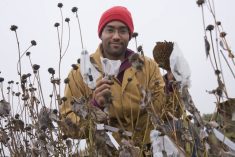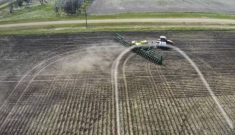They re standing-room only, virtually every time. Whether you re in Alberta or maybe in Ontario, wherever local-food organizers put on speed-dating events, they re jam-packed.
Even better, the mix of girls and boys is exactly what farmers want, with eager food buyers outnumbering the farmers often by three to one, and sometimes more.
Marlene Abrams of Alberta Agriculture hosted a speed-dating meeting in Edmonton last year that amazed her by attracting a crowd of 70 farmers and chefs. By the time she got to Calgary last winter, the electricity had spread and the crowd had swollen to 115, with the farmers surrounded by a crowd of chefs plus food buyers from major caterers and convention centres.
Read Also

How scientists are using DNA and climate data to breed crops of the future
A method for forecasting how crops will perform in different environments so that plant breeders can quickly select the best parents for new, climate-resilient varieties.
Also this winter but half a continent to the east, Kate Vsetula at the Guelph Wellington Local Food Initiative in Ontario held her first local-food speed dating event and was swarmed with a crowd of 100, far beyond what she had anticipated.
It was really buzzing, Vsetula says of the restaurant where they met. I could hardly believe it. It was a raging success.
In a world where farmers have trouble capturing the attention of non-farmers, how can you explain speed dating venues that are attracting almost more non-farmers than they can handle?
If you need proof that local food is more than a trend, this is it, Vsetula says. Local food is now. This is a huge opportunity.
Nicola Irving attended Abrams speed-dating event at Edmonton and walked away with several local-food connections that have led to sales, including a contact that is now seeing her supply the Shaw Convention Centre in the city.
It works, says Irving, who runs Irving Farm Fresh Meats with husband Alan at nearby Round Hills. It takes a certain kind of person you have to be willing to lead the dance but you can be highly successful.
There s more opportunity than we can even think about meeting, Irving says.
In Ontario, Ryan and Romy Schill thought they were through with the dating scene when they married in the summer of 2008, but since taking over their family farm they ve focused on finding alternative markets for their beef, lamb and chicken.
The Schills own Circle R Livestock in Wallenstein, Ont. and attended Vsetula s inaugural Speed dating for farmers food networking event in Guelph.
As in Alberta, the objective of the event was to create more marketing opportunities that would put local food to consumers. Vsetula and Abrams agree that the greatest challenge facing the local food market is the lack of a defined distribution network.
So Vsetula encouraged farmers to bring brochures, price lists and business cards to display on their allotted table. The Schills went one better, building an additional marketing tool for the event by creating a photo album of their farm and livestock.
Ryan believes the photo album helped initiate conversation while offering potential customers a glimpse of their operation. In practice, the album turned into a valuable visual aid too, helping him tell their farm story.
We wanted to get our foot in the door anyone s door to offer our products, says Schill. Without the local-food event we wouldn t have known where to start.
The Schills plan to follow up the sales leads they developed through the event. They will also be added to the 2009 edition of the Buy Local, Buy Fresh map and are looking forward to opening their barn doors for the 2009 Rural Romp Food Tour.
For farmers, the motivation to speed date is the same as it is for the lovelorn in the city. It s how do you meet the people who might be looking for you.
Sitting back and waiting for someone to call doesn t cut it, Abrams says. It doesn t matter how good your product is if nobody knows you re producing it.
Also inadequate is getting your name on the kind of list of potential local-food suppliers that many regions and government groups put together. They help, Abrams says. But they aren t nearly enough, given the tough realities of the restaurant, catering and food preparation businesses.
Abrams events are typical. Often, the session starts with a feature speaker who helps get farmers and buyers thinking about how to build bridges. Then, participants basically take numbers.
The farmers sat in a circle around the outside, and every five minutes a bell would ring, recalls Irving. Then the next buyer would come and sit in front of you, and you d have another five minutes to explain what you do, and figure out whether you might be a good match.
Abrams says the challenge for farmers is to start thinking like a food buyer. A few minutes in a speed-dating event is often all it takes.
Chefs and food buyers not only want to know what product you produce, they need to know how the farm will deliver it, Abrams says.















